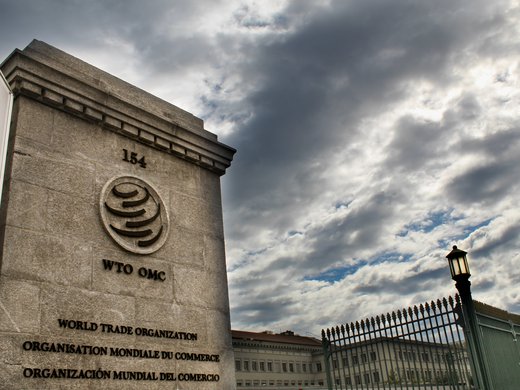The Covid-19 pandemic and vaccine development – as during the height of the HIV/Aids crisis in the 1990s – has brought to the forefront the debate within the World Trade Organization on the need to re-evaluate the balance of WTO intellectual property rules between exclusive ownership of new knowledge and broad public access. The WTO Agreement on Trade-Related Aspects of Intellectual Property Rights, commonly called the Trips Agreement, was completed in 1994 with the negotiated balance stating that IP protection and enforcement should contribute to innovation and technology transfer to the mutual advantage of all.
It should be conducive to social and economic welfare and not prevent WTO members from adopting “measures necessary to protect public health and nutrition, and to promote the public interest in sectors of vital importance to their socio-economic and technological development”.
Given the changes in the global economy, WTO IP rules must be updated to keep up. Disagreements between developed and developing countries over the meaning of the balance and where this line of balance lies, though, are obstacles to modernising the Trips agreement.
Developed countries must understand that the balance between exclusivity and access in the Trips Agreement is a central part of the bargain. They must keep the promise they made to engage in “technical cooperation” with all the least-developed country members of the WTO. In turn, developing countries must realise that their WTO obligations to protect and enforce IP rights are a necessary means to their further development.
To make the balance work in the new pandemic world, all members of the WTO must be willing to make and keep more promises by adding to their obligations in the Trips Agreement so it will be fit for purpose going forward.
Most immediately, as the newly elected WTO Director General Ngozi Okonjo-Iweala has said, the balance in the Trips Agreement must be reflected in how WTO members respond to the simultaneous urgency of developing new Covid-19 vaccines and providing them quickly throughout the world. As she recommends, a “third way” must be found within Trips to protect IP rights while also providing early global access to these vaccines.
New international IP agreements concluded since the early 1990s must be incorporated into the Trips Agreement to make them enforceable in WTO dispute settlement. This should include the two World Intellectual Property Organisation internet treaties and the Marrakesh Treaty, which facilitates access to published works for people who are blind, visually impaired or otherwise print disabled.
There have been many advances made in protecting IP rights in bilateral and regional trade arrangements. Worthy of mention are the nuances on the balance between exclusivity and access in one of these agreements, the Regional Comprehensive Economic Partnership among 15 Asian and Pacific countries, which underscores “the need to maintain an appropriate balance between the rights of IP right holders and the legitimate interests of users and the public interest”.
Modernisation of the Trips Agreement must also include protecting IP rights related to new technologies of digital trade. This updating could begin with making multilateral the basic provisions on transparency, customs duties, online consumer protection, online personal information and more, in Chapter 12 of the RCEP, Chapter 19 of the United States Mexico Canada Agreement and Chapter 14 of the Comprehensive and Progressive Agreement for Trans-Pacific Partnership.
There is need, too, for compromise on an appropriate balance between exclusivity and access for new pharmaceutical products, including biological drugs that are made from living organisms or that contain components of living organisms. The lines drawn between exclusivity and access in such new protections must foster innovation, and not simply create undue global rents for the IP right holders.
Lastly, there is equal need for providing more international IP protections for traditional knowledge that has been passed down for generations as the heritage of indigenous communities. WTO members must forge a stronger consensus on the line dividing where animal, plant and other natural resources can be patented or not. A pioneering feature of the RCEP is that it includes – for the first time in any trade agreement – provisions to protect genetic resources, traditional knowledge and folklore.
In all that WTO members do towards fully realising the balance in the Trips Agreement while updating trade-related IP rules, they must be guided by the first paragraph in the preamble on the first page of the WTO treaty, which proclaims that trade and economic endeavour should be conducted while “allowing the optimal use of the world’s resources in accordance with the objective of sustainable development”.
This article originally appeared in the South China Morning Post.



